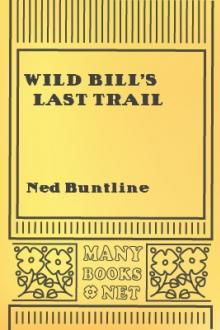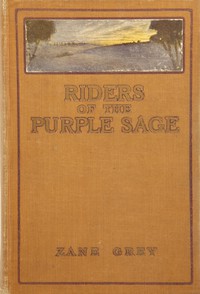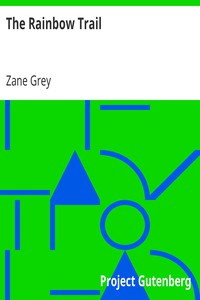The Heritage of the Desert: A Novel, Zane Grey [books for 9th graders .txt] 📗

- Author: Zane Grey
Book online «The Heritage of the Desert: A Novel, Zane Grey [books for 9th graders .txt] 📗». Author Zane Grey
Hare was nonplussed at the roar of laughter from the Mormons. August shook like a mountain in an earthquake.
“Eschtah says, 'you hurry, get many squaws—many wives.'”
Other Indians, russet-skinned warriors, with black hair held close by bands round their foreheads, joined the circle, and sitting before the fire clasped their knees and talked. Hare listened awhile, and then, being fatigued, he sought the cedar-tree where he had left his blankets. The dry mat of needles made an odorous bed. He placed a sack of grain for a pillow, and doubling up one blanket to lie upon, he pulled the others over him. Then he watched and listened. The cedar-wood burned with a clear flame, and occasionally snapped out a red spark. The voices of the Navajos, scarcely audible, sounded “toa's” and “taa's”—syllables he soon learned were characteristic and dominant—in low, deep murmurs. It reminded Hare of something that before had been pleasant to his ear. Then it came to mind: a remembrance of Mescal's sweet voice, and that recalled the kinship between her and the Navajo chieftain. He looked about, endeavoring to find her in the ring of light, for he felt in her a fascination akin to the charm of this twilight hour. Dusky forms passed to and fro under the trees; the tinkle of bells on hobbled mustangs rang from the forest; coyotes had begun their night quest with wild howls; the camp-fire burned red, and shadows flickered on the blanketed Indians; the wind now moaned, now lulled in the cedars.
Hare lay back in his blankets and saw lustrous stars through the network of branches. With their light in his face and the cold wind waving his hair on his brow he thought of the strangeness of it all, of its remoteness from anything ever known to him before, of its inexpressible wildness. And a rush of emotion he failed wholly to stifle proved to him that he could have loved this life if—if he had not of late come to believe that he had not long to live. Still Naab's influence exorcised even that one sad thought; and he flung it from him in resentment.
Sleep did not come so readily; he was not very well this night; the flush of fever was on his cheek, and the heat of feverish blood burned his body. He raised himself and, resolutely seeking for distraction, once more stared at the camp-fire. Some time must have passed during his dreaming, for only three persons were in sight. Naab's broad back was bowed and his head nodded. Across the fire in its ruddy flicker sat Eschtah beside a slight, dark figure. At second glance Hare recognized Mescal. Surprise claimed him, not more for her presence there than for the white band binding her smooth black tresses. She had not worn such an ornament before. That slender band lent her the one touch which made her a Navajo. Was it worn in respect to her aged grandfather? What did this mean for a girl reared with Christian teaching? Was it desert blood? Hare had no answers for these questions. They only increased the mystery and romance. He fell asleep with the picture in his mind of Eschtah and Mescal, sitting in the glow of the fire, and of August Naab, nodding silently.
“Jack, Jack, wake up.” The words broke dully into his slumbers; wearily he opened his eyes. August Naab bent over him, shaking him gently.
“Not so well this morning, eh? Here's a cup of coffee. We're all packed and starting. Drink now, and climb aboard. We expect to make Seeping Springs to-night.”
Hare rose presently and, laboring into the wagon, lay down on the sacks. He had one of his blind, sickening headaches. The familiar lumbering of wheels began, and the clanking of the wagon-chain. Despite jar and jolt he dozed at times, awakening to the scrape of the wheel on the leathern brake. After a while the rapid descent of the wagon changed to a roll, without the irritating rattle. He saw a narrow valley; on one side the green, slow-swelling cedar slope of the mountain; on the other the perpendicular red wall, with its pinnacles like spears against the sky. All day this backward outlook was the same, except that each time he opened aching eyes the valley had lengthened, the red wall and green slope had come closer together in the distance. By and by there came a halt, the din of stamping horses and sharp commands, the bustle and confusion of camp. Naab spoke kindly to him, but he refused any food, lay still and went to sleep.
Daylight brought him the relief of a clear head and cooled blood. The camp had been pitched close under the red wall. A lichen-covered cliff, wet with dripping water, overhung a round pool. A ditch led the water down the ridge to a pond. Cattle stood up to their knees drinking; others lay on the yellow clay, which was packed as hard as stone; still others were climbing the ridge and passing down on both sides.
“You look as if you enjoyed that water,” remarked Naab, when Hare presented himself at the fire. “Well, it's good, only a little salty. Seeping Springs this is, and it's mine. This ridge we call The Saddle; you see it dips between wall and mountain and separates two valleys. This valley we go through to-day is where my cattle range. At the other end is Silver Cup Spring, also mine. Keep your eyes open now, my lad.”
How different was the beginning of this day! The sky was as blue as the sea; the valley snuggled deep in the embrace of wall and mountain. Hare took a place on the seat beside Naab and faced the descent. The line of Navajos, a graceful straggling curve of color on the trail, led the way for the white-domed wagons.
Naab pointed to a little calf lying half hidden under a bunch of sage. “That's what I hate to see. There's a calf, just born; its mother has gone in for water. Wolves and lions range this valley. We lose hundreds of calves that way.”
As far as Hare could see red and white and black cattle speckled the valley.
“If not overstocked, this range is the best in Utah,” said Naab. “I say Utah, but it's really Arizona. The Grand Canyon seems to us Mormons to mark the line. There's enough browse here to feed a hundred thousand cattle. But water's the thing. In some seasons the springs go almost dry, though Silver Cup holds her own well enough for my cattle.”
Hare marked the tufts of grass lying far apart on the yellow earth; evidently there was sustenance enough in every two feet of ground to support only one tuft.
“What's that?” he asked, noting a rolling cloud of dust with black bobbing borders.
“Wild mustangs,” replied Naab. “There are perhaps five thousand on the mountain, and they are getting to be a nuisance. They're almost as bad as sheep on the browse; and I should tell you that if sheep pass over a range once the cattle will starve. The mustangs are getting too plentiful. There are also several bands of wild horses.”
“What's the difference between wild horses and mustangs?”
“I haven't figured that out yet. Some say the Spaniards left horses in here three hundred years ago. Wild? They are wilder than any naturally wild animal that ever ran on four legs. Wait till you get a look at Silvermane or Whitefoot.”





Comments (0)